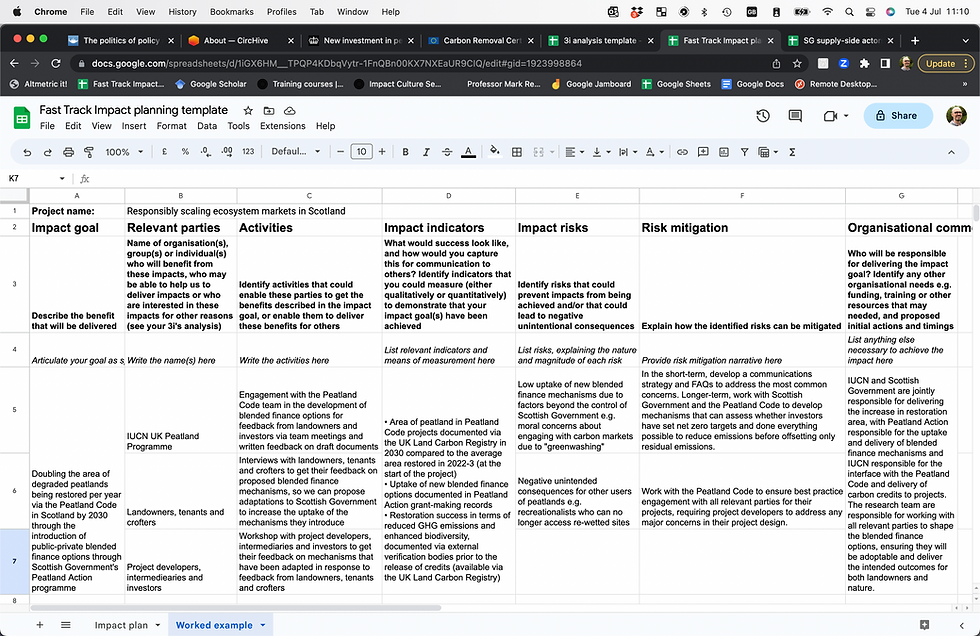Fast Track Impact Planning Template
- Prof. Mark Reed
- Mar 18, 2019
- 4 min read
Updated: Jul 10, 2023
If you want your research to make an impact, you need a plan. In this video and guide, I will show you how to use the Fast Track Impact Planning Template to come up with a strategic plan that can save you time and ensure you can reach and prove the impacts you seek.
To get started, find the blank template on Google Sheets, and in the Google Sheets menu go to File > Make a copy to save an editable version, and watch the video:
The planning template has been updated recently so it differs slightly from the one featured in the video below:
Who do you want to benefit from your research?
The fist step in an impact plan is to set your goal, but this is often the hardest part. If you are struggling to come up with impact goals, start by doing a publics/stakeholder analysis. This will give you a list of organisations or groups who should in theory be interested in your research, and may lead you to identify benefits for these groups. If you don't get as far as identifying benefits, ask yourself why they are interested in your research to convert interest to benefit. If impact are simply benefits from your research, then you have just come up with an impact goal. Don't worry if it is a bit basic - you will revisit this and improve it later. Based on your stakeholder analysis, you can also complete the second and third columns of the Impact Planning Template, detailing who your stakeholders or publics are, and what aspects of your research you think they are likely to be interested in.
What activities get benefits to these people?
Next, identify activities that will engage each of the organisations or groups you have identified. Ask whether you may need different activities for different sub-groups (e.g. civil servants versus politicians or different teams within an organisation), so you have an activity plan that is tailored to the interests and other characteristics of each group.
How will I know I'm achieving impact?
The next step is to identify indicators that will tell you if your activities are working (so you can identify issues and get things back on track if necessary). You also need to identify indicators that will tell you if you are achieving impact. What milestones do you expect to see on the pathway to impact and how will you know when you've actually achieved your impact goal? I encourage you to also identify a "means of measurement", whether quantitative or qualitative, so you get realistic about exactly how you will get the data you need to monitor each indicator. In some cases you will need a baseline or you may need to design some research to collect the necessary data. This may have a resource implication, which you can enter into the penultimate column in the template. If you are unable to get resources then you'll need to think of alternative indicators that are within your grasp.
At this point, revisit your impact goal in the first column, and see if you can make it more specific and measurable, based on the thinking you've done on indicators. The more specific your impact goal, the more credible it will be (and the more competitive it will be in a funding bid).
What might go wrong?
Consider what might go wrong with the activities you have planned (e.g. no-one engages with the activities you plan) and consider barriers to you impact (or worse, unintended negative consequences). How might you mitigate each of these risks?

What will I prioritise?
Finally, stand back from your impact plan and decide which impact goals you want to pursue, and which activities you will prioritise to reach these goals for specific groups that are important to you. I tend to focus on the goals that inspire me most, and then prioritise activities I think I can realistically do within the time and resources at my disposal. If it is important that you will be able to evaluate and claim impacts (for example to a funder), then you may prioritise impacts and associated pathways that have impact indicators that are easy to measure. The choice is yours. Be strategic and use your limited time wisely.
Planned impacts happen. Make your plan now.
About the author
Mark is a recognized international expert in research impact with >150 publications that have been cited over 14,000 times. He holds a Research England and N8 funded Chair in Socio-Technical Innovation at Newcastle University, and has won awards for the impact of his research. His work has been funded by ESRC, STFC, NERC, AHRC and BBSRC, and he regularly collaborates and publishes with scholars ranging from the arts and humanities to physical sciences. He has reviewed research and sat on funding panels for the UK Research Councils (including MRC, BBSRC, ESRC, NERC), EU Horizon 2020 and many national and international research funders. He has been commissioned to write reports and talk to international policy conferences by the United Nations, has acted as a science advisor to the BBC, and is research lead for an international charity.
Mark regularly advises research funders, helping write funding calls, evaluating the impact of funding programmes and training their staff (his interdisciplinary approach to impact has been featured by the UKRI, the largest UK research funder, as an example of good practice). He also regularly advises on impact to policy makers (e.g. evaluating the impact of research funded by Scottish Government and Forest Research), research projects (e.g. via the advisory panel for the EU Horizon 2020 SciShops project) and agencies (e.g. Australian Research Data Common).
Read his research on impact planning:
Reed MS, Bryce R, Machen R (2018) Pathways to policy impact: a new approach for planning and evidencing research impact. Evidence & Policy 14: 431-458



